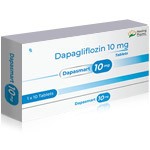Chronic Kidney Disease: What You Need to Know


Chronic Kidney Disease (CKD) is a progressive condition in which the kidneys gradually lose their ability to function properly over time. The kidneys play a crucial role in filtering waste products from the blood, maintaining fluid balance, regulating blood pressure, and producing hormones that are essential for various body functions. When these organs are compromised, the effects on overall health can be severe, leading to a range of complications and impacting the quality of life.
In this article, we will explore the causes of CKD, its stages, life expectancy with the condition, early symptoms, and the role of Dapagliflozin in its treatment.
What is the Cause of Chronic Kidney Disease (CKD)?
CKD can develop due to several underlying causes, many of which damage the kidneys over time. The most common causes of CKD include diabetes, high blood pressure, and heart disease. Each of these conditions can impair kidney function in different ways.
Diabetes is the leading cause of CKD. High blood sugar levels over an extended period can damage the blood vessels in the kidneys, making it harder for them to filter waste from the blood effectively. This condition is known as diabetic nephropathy and is a significant risk factor for kidney failure.
High blood pressure (Hypertension) is another major contributor to CKD. Persistent high blood pressure can cause damage to the blood vessels in the kidneys, impairing their ability to function. Over time, this damage leads to reduced kidney function and can contribute to the progression of CKD.
Heart disease and conditions that affect the heart’s ability to pump blood efficiently, such as congestive heart failure, can also lead to CKD. Reduced blood flow to the kidneys can cause them to become less effective at filtering waste products from the blood.
Other causes of CKD include:
- Glomerulonephritis: Inflammation of the tiny filters in the kidneys (glomeruli) due to an infection, autoimmune disease, or other factors.
- Polycystic kidney disease (PKD): A genetic condition in which fluid-filled cysts develop in the kidneys, leading to impaired function.
- Chronic urinary tract obstruction: Long-term blockage of the urinary tract due to conditions like kidney stones or an enlarged prostate.
- Medications and toxins: Certain medications, such as nonsteroidal anti-inflammatory drugs (NSAIDs) and some antibiotics, can cause kidney damage if used long-term. Toxic substances and heavy metals can also damage kidney tissue.
What is Stage 4 Kidney Disease?
CKD is classified into five stages, based on the severity of kidney function loss. These stages are determined by the glomerular filtration rate (GFR), a measure of how well the kidneys filter blood. The stages range from mild kidney damage (Stage 1) to complete kidney failure (Stage 5).
Stage 4 CKD is considered severe kidney damage. At this stage, kidney function is significantly reduced, and the kidneys are operating at only 15-29% of their normal capacity. People in Stage 4 often experience a number of symptoms and complications due to the kidneys’ reduced ability to filter waste and regulate fluid and electrolyte levels.
Symptoms that may appear in Stage 4 CKD include:
- Fatigue: People may feel excessively tired or weak due to the buildup of waste products and toxins in the blood.
- Swelling (Edema): Fluid retention can cause swelling in the feet, ankles, legs, and face.
- Shortness of breath: Fluid buildup in the lungs (pulmonary edema) can cause breathing difficulties.
- Nausea and vomiting: As kidney function deteriorates, toxins accumulate, leading to gastrointestinal symptoms.
- Loss of appetite: Accumulation of waste products in the blood can cause a decrease in appetite and a general feeling of being unwell.
At this stage, patients may need to begin discussing dialysis or kidney transplantation as potential treatment options, depending on the progression of the disease and overall health.
How Long Do People Live with Chronic Kidney Disease?
The life expectancy of someone with CKD depends on a variety of factors, including the underlying cause of the disease, the stage of CKD, the person’s age, overall health, and whether or not they are receiving appropriate treatment. Early diagnosis and management of CKD can help slow the progression of the disease and improve life expectancy.
In general, CKD is a progressive disease, meaning that it worsens over time if left untreated. However, with proper management, many people with CKD can live for many years before reaching end-stage kidney failure (Stage 5), where dialysis or a kidney transplant becomes necessary.
The key to prolonging life in individuals with CKD lies in controlling underlying conditions like diabetes and high blood pressure, avoiding nephrotoxic substances, and adhering to medical advice and treatment regimens. People with CKD should work closely with their healthcare providers to monitor kidney function, adjust medications as needed, and manage lifestyle factors like diet and exercise.
For those who progress to Stage 5 CKD, dialysis or kidney transplantation becomes essential to sustain life. Dialysis can help filter waste products from the blood, but it requires regular treatments. A kidney transplant, if available, offers the possibility of restoring kidney function but comes with its own set of challenges, such as finding a suitable donor and managing immunosuppressive medications to prevent organ rejection.
What Are the First Symptoms of Chronic Kidney Disease?
CKD often develops slowly over many years, and in the early stages, symptoms may be mild or absent. This is why CKD is sometimes referred to as a “silent disease.” People may not realize they have CKD until it has progressed to a more advanced stage. However, there are several early signs and symptoms that may indicate kidney problems:
- Fatigue: Feeling unusually tired or weak, even after adequate rest, is a common early symptom of CKD.
- Swelling (Edema): Mild swelling in the feet, ankles, and hands may be one of the first noticeable symptoms.
- Changes in urination: People with CKD may notice changes in the frequency, amount, or appearance of urine. They may urinate more frequently at night (nocturia) or less often overall.
- Shortness of breath: Fluid buildup in the lungs can cause difficulty breathing, especially during physical activity.
- Nausea and vomiting: These symptoms can arise from the accumulation of waste products in the bloodstream (uremia).
- Loss of appetite: A decreased desire to eat or a general sense of feeling unwell can occur as kidney function declines.
- High blood pressure: CKD can contribute to or worsen high blood pressure, which in turn accelerates kidney damage.
Because these symptoms are often subtle and can be attributed to other health conditions, they are often overlooked. Regular kidney function tests, including blood tests to measure serum creatinine and eGFR, are essential for early detection.
The Role of Dapagliflozin in the Treatment of Chronic Kidney Disease
Dapagliflozin is a medication that belongs to a class of drugs known as sodium-glucose co-transporter-2 (SGLT2) inhibitors. It is primarily used to treat Type 2 diabetes by reducing blood sugar levels, but it has also been shown to have a beneficial effect on kidney function, making it an important treatment option for individuals with CKD.
The mechanism of action of Dapagliflozin involves inhibiting the SGLT2 protein in the kidneys. This protein normally helps reabsorb glucose back into the bloodstream during filtration. By blocking SGLT2, Dapagliflozin reduces glucose reabsorption, resulting in increased glucose excretion in the urine. This helps lower blood sugar levels. However, beyond its effects on diabetes, Dapagliflozin also provides direct kidney benefits.
In clinical trials, Dapagliflozin has been shown to reduce the progression of CKD, especially in individuals with Type 2 diabetes and Stage 1-4 CKD. By reducing kidney damage, it slows the decline in kidney function, helps control blood pressure, and reduces proteinuria (the presence of abnormal amounts of protein in the urine, a sign of kidney damage). This can delay the need for dialysis or kidney transplantation in some individuals.
Additionally, Dapagliflozin has been shown to reduce the risk of hospitalization for heart failure, making it an ideal choice for people who have both CKD and cardiovascular disease. It also helps reduce fluid retention, a common problem in CKD, and has been linked to lower risks of heart attacks and strokes.
Conclusion
Chronic Kidney Disease is a serious and progressive condition that can lead to kidney failure and other life-threatening complications. The causes of CKD are varied, but the most common include diabetes, high blood pressure, and heart disease. Early diagnosis and appropriate treatment are essential for managing the disease and improving outcomes.
Stage 4 CKD is a critical stage where kidney function is significantly reduced, and life expectancy depends on managing the condition effectively. Symptoms of CKD can be subtle at first, making early detection challenging. Dapagliflozin, a medication commonly used to treat Type 2 diabetes, has proven effective in slowing the progression of CKD, making it an essential part of treatment for many individuals with the disease.
By understanding the causes, stages, and treatment options for CKD, individuals can take proactive steps to manage their condition and reduce the risk of complications. Early intervention, careful monitoring, and medication like Dapagliflozin play a vital role in improving the quality of life for those affected by CKD.
Medically Reviewed by Dr. Rabeea Aboufakher, MD
(Updated at Jul 7 / 2025)

